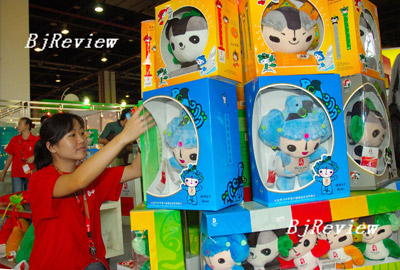
The manager of the Wenjia Noodles Restaurant in Beijing was shocked when he was fined by the local industry and commerce administration. "The restaurant prints such words as 'wish the 2008 Beijing Olympics success' on their napkins, which is not authorized by the Beijing Organizing Committee for the Games of the XXIX Olympiad (BOCOG), and we deem it to be a copyright infringement," said Zhang Dejin, an official with the Haidian District Administration of Industry and Commerce.
Gao Xiaoyu, the restaurant manager, said, "At first we felt it was an injustice as we do hope from the bottom of our hearts that the Beijing Olympics will be a big success, and we didn't realize our violations until the officers explained to us the issue of Olympic intellectual property rights (IPR)."
"It wouldn't be a successful Olympic Games if we failed to protect the intellectual property rights of the big sporting event," said Liu Yan, an official in charge of legal affairs with the BOCOG. For the Beijing Olympics, the issue involves copyrights regarding the Games' trademark, special symbols, works and other productions.
Early in 2001, when China won the bid for the 2008 Olympics, the country promised that it would "ensure the legal protection of the Olympic symbol, emblem and mascot," according to Liu. In November of that year, a set of regulations on Olympic IPR was issued. These regulations have won praise both at home and abroad since they are expected to effectively reduce the abuse of copyrighted Olympic properties.
"China also signed dozens of international IPR conventions," said Wei Zhi, an associate professor at the Peking University School of Law. He said the BOCOG has registered the Beijing Olympic emblem as a trademark with the Trademark Office under the State Administration for Industry and Commerce. According to the Copyright Law of China, Olympic-related material, such as the emblem, theme song, promotional ads and performances, is under legal protection.
"We will inform the copyright holder of suspected copyright infringements and the BOCOG will trace the matter and confirm if they are actual IPR infringements. We will show no mercy over violations of Olympic-related copyrights," said Liu Yanhua, an official with the Beijing Administration for Industry and Commerce.
The Beijing Customs has cooperated with the BOCOG as well. "We have exchanged opinions with their legal affairs department on all the possible IPR problems and how to deal with them," said Cai Bin, an official with the Beijing Customs, which also has regularly invited legal experts from the BOCOG to train the Customs staff workers.
Raising awareness
In an effort to cultivate a favorable Olympic IPR protection environment, the legal affairs section of the BOCOG is organizing activities to boost the Olympic IPR protection awareness of the public in shopping malls, schools and communities.
Currently, volunteers are busy collecting evidence of IPR violations. Dozens of companies have signed a joint pledge saying that they will fulfill their social responsibility, which is echoed by many news agencies as well.
To avoid IPR disputes, all those providing ideas for the opening and closing ceremonies of the 2008 Olympic Games must sign agreements with the BOCOG on the transfer of property rights.
The mascots for the 2008 Olympic Games were unveiled in Beijing at the end of 2005: five doll-like figures called Fuwa ("good-luck dolls"). The BOCOG has submitted applications on the Chinese mainland, Hong Kong and Macao to register the trademark for the mascots' images and their Chinese and English names.
| 